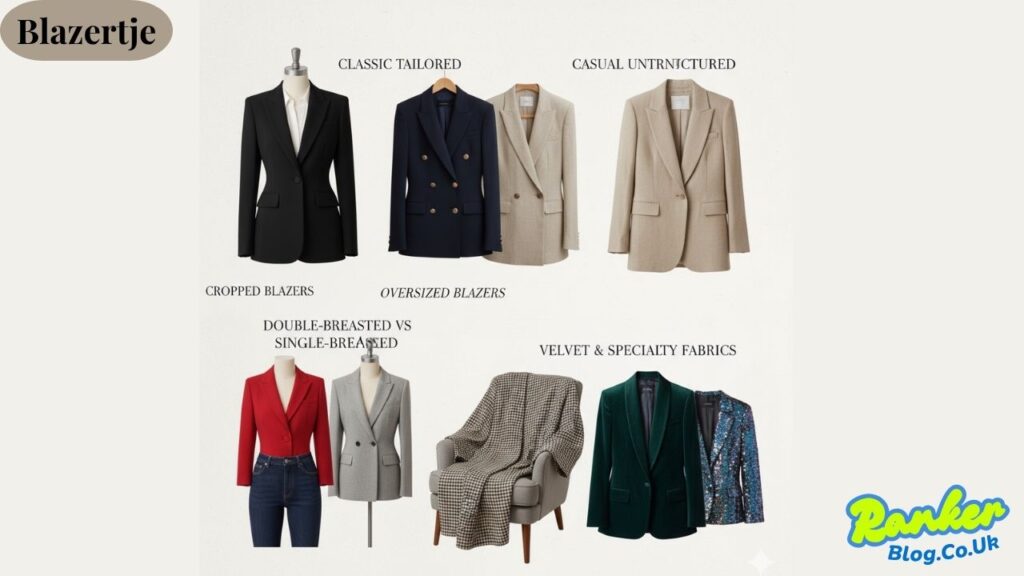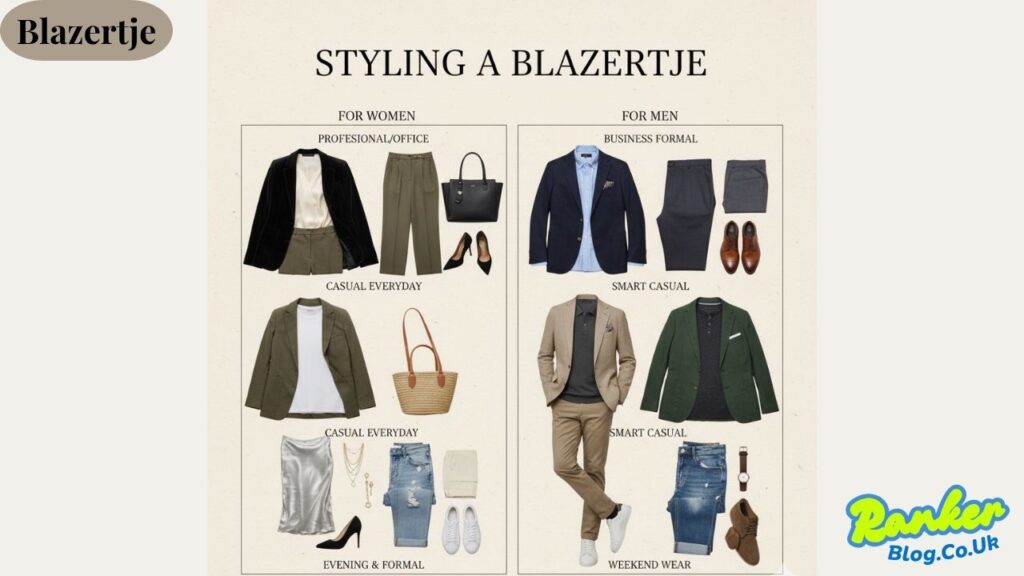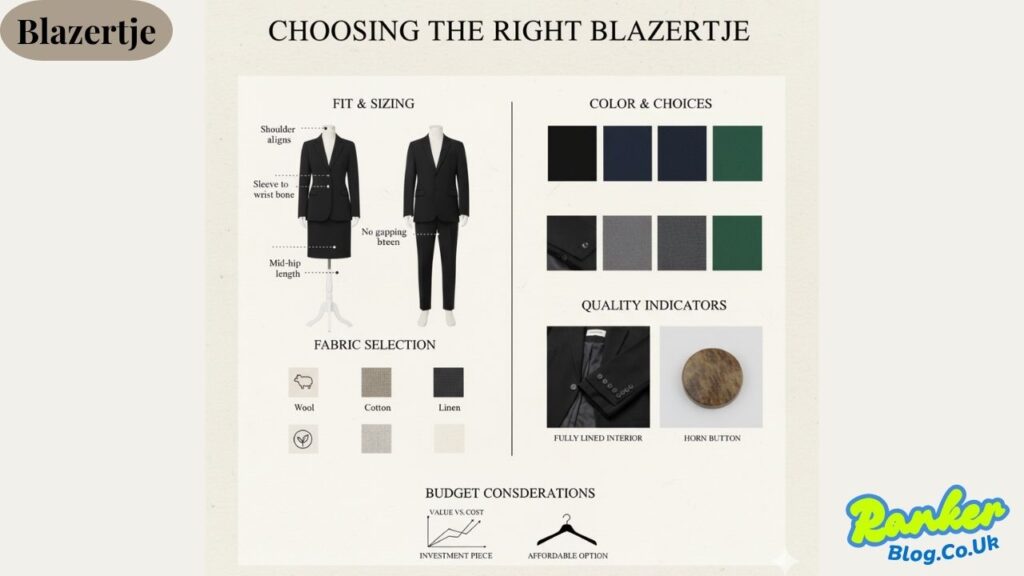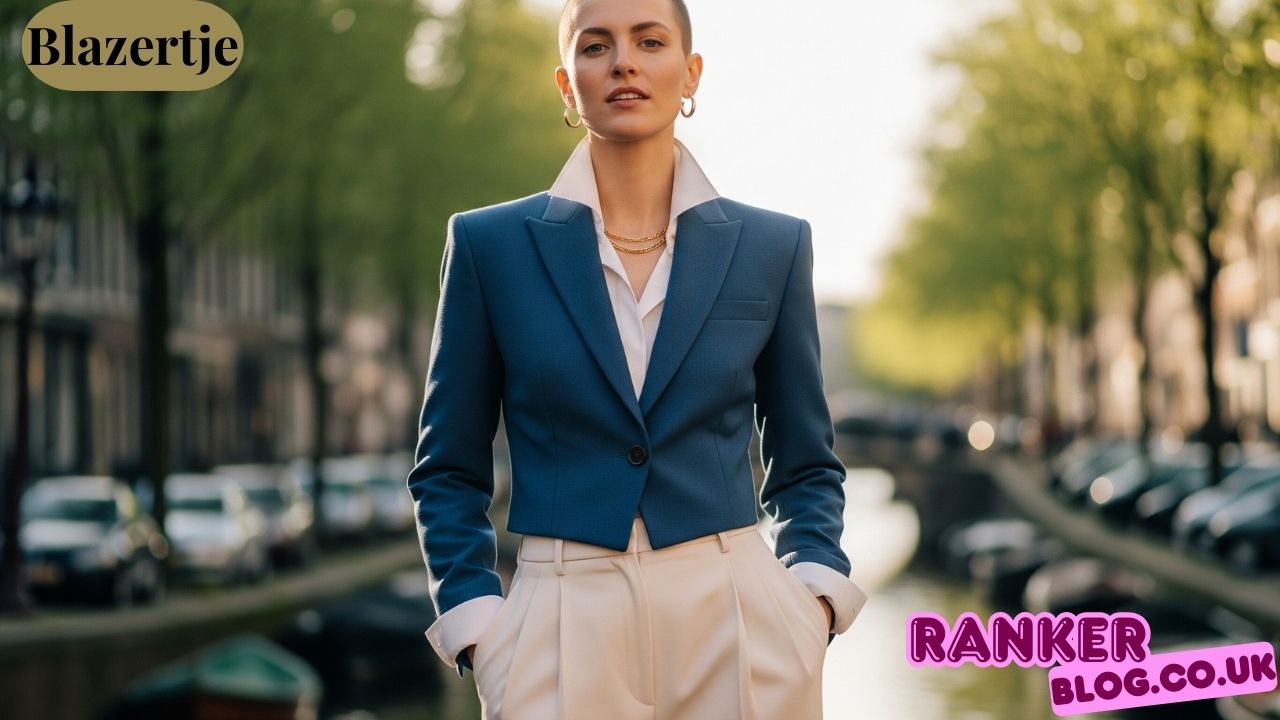Introduction
A blazertje is more than just a jacket—it’s a versatile wardrobe essential that effortlessly bridges the gap between casual and formal wear. This timeless piece has evolved from its origins in British naval uniforms to become a must-have item in closets worldwide. Whether someone is heading to the office, meeting friends for brunch, or attending a semi-formal event, a well-chosen blazertje can elevate any outfit instantly.
The blazer has undergone a significant transformation over the decades. What started as a structured, navy blue jacket worn by rowing club members in the 19th century has blossomed into countless styles, colors, and fabrics. Today’s fashion landscape offers everything from the sophisticated zwart blazertje to innovative designs that push traditional boundaries.
Why do blazers remain such a wardrobe staple? The answer lies in their remarkable versatility. A single blazertje can be dressed up with tailored trousers for professional settings or dressed down with jeans for weekend outings. This adaptability makes it a smart investment for anyone looking to maximize their wardrobe options without overcrowding their closet.
This comprehensive guide will explore everything readers need to know about blazertjes—from identifying different types and mastering styling techniques to selecting the perfect fit and maintaining the garment for years to come.
Types of Blazertjes

Understanding the various types of blazertjes available helps in making informed purchasing decisions. Each style serves different purposes and suits different occasions.
Classic Tailored Blazers represent the traditional approach to this garment. These structured pieces feature defined shoulders, a fitted waist, and clean lines that create a polished silhouette. The classic zwart blazertje in a tailored cut remains a timeless choice that works across seasons and trends.
Casual Unstructured Blazers offer a more relaxed alternative. Without heavy shoulder padding or rigid construction, these blazertjes provide comfort while maintaining a put-together appearance. They work beautifully for smart-casual environments where formality meets approachability.
Double-Breasted vs. Single-Breasted designs offer distinct aesthetic choices. Double-breasted blazertjes feature overlapping front flaps with two parallel rows of buttons, creating a more formal and substantial look. Single-breasted versions, with their single row of buttons, provide versatility and easier wearability for everyday situations.
Cropped Blazers have gained popularity in recent years, especially among those who appreciate contemporary fashion trends. These shorter-length blazertjes hit at or above the natural waist, creating a modern silhouette that pairs exceptionally well with high-waisted bottoms.
Oversized Blazers embrace the relaxed, borrowed-from-the-boys aesthetic. These roomy blazertjes offer a fashion-forward look that balances structure with comfort, perfect for creating effortlessly cool outfits.
Velvet and Specialty Fabrics add texture and visual interest to blazer collections. While traditional wool and cotton remain popular, specialty fabrics allow for unique expressions of personal style, particularly for evening events or creative workplaces.
Styling a Blazertje

Mastering the art of styling a blazertje opens up endless outfit possibilities for various occasions and settings.
For Women
Professional/Office Looks benefit immensely from a well-fitted blazertje. Pairing a zwart blazertje with matching trousers creates a powerful, cohesive suit look perfect for important meetings or presentations. Alternatively, combining the blazer with a pencil skirt and blouse offers a feminine yet authoritative appearance. For added versatility, wearing a blazertje over a simple sheath dress transforms the outfit from basic to boardroom-ready.
Casual Everyday Outfits showcase the blazertje’s versatility beyond professional settings. Throwing a blazer over a plain t-shirt and jeans instantly elevates a casual look. For weekend brunches, pairing a blazertje with a flowy midi skirt and sneakers creates an effortlessly chic ensemble. The key lies in mixing structured pieces with relaxed elements for balanced styling.
Evening and Formal Occasions allow for more creative blazertje styling. A sleek zwart blazertje worn over a silk camisole with tailored trousers or a slip dress creates sophisticated evening wear. Adding statement jewelry and heels completes the transformation from day to night.
Seasonal Styling Tips help maximize blazertje wearability year-round. During warmer months, lightweight fabrics and rolled sleeves keep things comfortable while maintaining style. In cooler weather, layering the blazertje over turtlenecks or under coats extends its functionality throughout changing temperatures.
For Men
Business Formal Combinations establish professional credibility through thoughtful blazertje styling. A classic blazer paired with dress trousers, a crisp button-down shirt, and leather dress shoes creates timeless business attire. The zwart blazertje particularly excels in formal business environments due to its sophisticated, neutral presence.
Smart Casual Approaches balance professionalism with comfort. Combining a blazertje with chinos and a polo shirt or casual button-down creates an appropriate look for business-casual offices or client meetings in relaxed settings. Loafers or clean sneakers complete this approachable yet polished ensemble.
Weekend Wear demonstrates that blazertjes aren’t just for workdays. Pairing a casual blazer with well-fitted jeans and a Henley or crew-neck t-shirt creates weekend-ready outfits that look intentional without appearing overdressed. This styling approach works particularly well for dinner dates or cultural events.
Layering Techniques extend the blazertje’s usability across seasons. During transitional weather, wearing the blazer over a lightweight sweater adds warmth without bulk. In winter, layering under an overcoat provides additional insulation while maintaining a streamlined appearance.
Choosing the Right Blazertje

Selecting the perfect blazertje requires considering several important factors that affect both appearance and comfort.
Fit and Sizing Considerations form the foundation of blazertje selection. The shoulders should align with natural shoulder lines without drooping or pulling. Sleeves should reach the wrist bone, allowing about half an inch of shirt cuff to show. The blazertje should button comfortably without pulling or gaping, and the length should hit around mid-hip for the most flattering proportions.
Fabric Selection impacts both the blazertje’s appearance and its appropriate use cases. Wool blazertjes offer year-round versatility and natural wrinkle resistance. Cotton provides breathability for warmer weather, while linen creates a relaxed, summery aesthetic. Fabric blends combine the best properties of multiple materials, offering enhanced durability and easier care.
Color Choices significantly influence a blazertje’s versatility. The zwart blazertje stands as the most versatile option, complementing virtually any color palette and working across formal and casual contexts. Navy blue offers similar versatility with slightly less formality. Gray tones provide neutral sophistication, while statement colors like burgundy or forest green add personality to wardrobes.
Quality Indicators help distinguish well-made blazertjes from cheaper alternatives. Look for fully lined interiors, functioning buttonholes on sleeves, horn buttons rather than plastic, and even stitching throughout. Quality construction ensures the blazertje maintains its shape and appearance through years of wear.
Budget Considerations require balancing cost with value. While premium blazertjes command higher prices, their superior construction and materials often justify the investment through extended lifespan. However, affordable options can serve well for those building their wardrobe or requiring occasional blazer wear. The key lies in finding the best quality within individual budget constraints.
Blazertje Shopping Guide
Navigating the blazertje marketplace requires understanding where and how to find the best options.
Popular Brands and Retailers offer varying price points and style aesthetics. High-end fashion houses provide luxury blazertjes with impeccable tailoring and premium materials. Mid-range retailers offer solid quality and contemporary styling at accessible prices. Fast fashion brands provide trendy options for budget-conscious shoppers, though longevity may be limited.
Online vs. In-Store Shopping each presents distinct advantages. Online shopping offers convenience, a broader selection, and often competitive pricing. However, in-store shopping allows for trying on different sizes and styles, assessing fabric quality firsthand, and receiving immediate assistance from sales staff. Many shoppers find success combining both approaches—researching online before visiting stores for final fitting and purchase.
Tailoring and Alterations transform off-the-rack blazertjes into perfectly fitted garments. Even expensive blazers often benefit from minor adjustments. Common alterations include sleeve shortening, taking in or letting out the waist, and adjusting overall length. Investing in professional tailoring ensures the blazertje flatters individual body proportions.
Sustainable and Ethical Options appeal to environmentally and socially conscious consumers. Second-hand and vintage blazertjes offer unique styles while reducing environmental impact. Brands focusing on sustainable production methods, fair labor practices, and eco-friendly materials provide guilt-free shopping experiences for those prioritizing ethical consumption.
Care and Maintenance
Proper care extends a blazertje’s lifespan and maintains its appearance through countless wearings.
Cleaning and Washing Instructions vary based on fabric composition. Most blazertjes benefit from professional dry cleaning to preserve shape and finish. However, some cotton or synthetic-blend blazers may be machine washable—always check care labels before attempting home washing. Spot cleaning addresses minor stains without requiring full cleaning, helping maintain the garment between deeper cleanings.
Storage Tips prevent damage and maintain the blazertje’s structure. Hanging blazers on proper wooden or padded hangers preserves shoulder shape and prevents creasing. Garment bags protect against dust and moths during extended storage periods. Allowing blazertjes to air out between wearings prevents odor buildup and reduces cleaning frequency.
Repair and Upkeep address wear issues before they become irreparable. Replacing loose or missing buttons maintains functionality and appearance. Repairing small tears or loose seams prevents further damage. Regular inspection catches problems early when fixes remain simple and affordable.
When to Dry Clean vs. Home Care depends on several factors. Professional dry cleaning suits delicate fabrics, heavily soiled garments, and blazertjes requiring professional pressing. Home care works for minor refreshing—steaming removes wrinkles, airing eliminates odors, and spot treatment handles small stains. Balancing both approaches keeps blazertjes looking their best while managing cleaning costs.
Conclusion
The blazertje stands as one of fashion’s most enduring and versatile pieces. From the timeless appeal of a zwart blazertje to contemporary interpretations that push style boundaries, these garments offer something for every wardrobe and occasion. Their ability to transition seamlessly between professional and casual settings makes them invaluable investments for anyone seeking to maximize their clothing options.
Viewing a quality blazertje as an investment piece shifts the purchasing perspective. While initial costs may seem significant, the cost-per-wear decreases dramatically when a well-made blazer serves multiple purposes over many years. Choosing classic styles in versatile colors ensures the blazertje remains relevant despite changing fashion trends.
Final styling tips emphasize experimentation and personal expression. While guidelines provide helpful starting points, the best blazertje looks reflect individual personality and lifestyle needs. Don’t hesitate to mix unexpected combinations, play with proportions, or break traditional styling rules. The perfect blazertje serves its wearer’s unique needs while making them feel confident and comfortable in any situation.
Also Read: The Ultimate Guide to Sweat Resistant Bolo Ties Durability Meets Western Style

